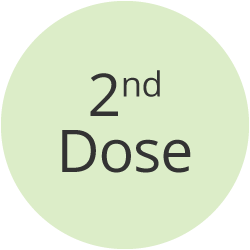Vaccine (Shot) for Polio

How to pronounce Polio: [POH-lee-oh]
Four doses of the polio shot for children are recommended by doctors as the best way to protect against polio.
When should my child get the polio shot?
Your child will need one dose at each of the following ages:
Why should my child get the polio shot?
- Protects your child from polio, a potentially serious disease.
- Protects your child from developing lifelong paralysis from polio.
The polio shot is safe.
The polio shot is very safe, and is effective at preventing polio. Vaccines like any medicine, can have side effects. These are usually mild and go away on their own.
What are the side effects?
- Redness, swelling, or pain where the shot was given
Prepare for your child's vaccine visit and learn about how you can:
- Research vaccines and ready your child before the visit
- Comfort your child during the appointment
- Care for your child after the shot
What is polio?
Polio, or poliomyelitis, is a disabling and life-threatening disease caused by the poliovirus. The virus can infect a person’s spinal cord, causing paralysis (can’t move parts of the body). Paralysis caused by poliovirus occurs when the virus replicates in and attacks the nervous system. The paralysis can be lifelong, and it can be deadly.
What are the symptoms of polio infection?
Most people who get infected with poliovirus do not have any symptoms. Some people (25 people out of 100) will have flu-like symptoms. These symptoms usually last 2 to 5 days.
In rare cases, poliovirus infection can be very serious. People will have weakness or paralysis in their arms, legs, or both. This paralysis or weakness can last a lifetime.
Is it serious?
The risk of lifelong paralysis is very serious. Even children who seem to fully recover can develop new muscle pain, weakness, or paralysis as adults, 15 to 40 years later.
About 2 to 10 children out of 100 who have paralysis from polio die because the virus affects the muscles that help them breathe.
How does polio spread?
Poliovirus is very contagious. It spreads through contact with:
- The stool (poop) of an infected person.
- Droplets from a sneeze or cough of an infected person.
If you get stool or droplets from an infected person on your hands and you touch your mouth, you can get infected. Also, if your child puts objects, like toys, that have stool or droplets on them into their mouth, they can get infected. Sharing utensils with an infected person can also spread the virus.
An infected person can spread the virus to others immediately before and up to 2 weeks after symptoms appear.
- The virus may live in an infected person’s intestines for many weeks. They can contaminate food and water when they touch it with unwashed hands.
- People who don’t have symptoms can still pass the virus to others and make them sick.
Do people still get polio in the United States?
Thanks to a successful vaccination program, most people in the United States are protected from polio. However, people who are not vaccinated or who haven’t received all recommended doses may be at risk of getting polio. The disease still occurs in other parts of the world. It only takes one person with polio traveling from another country to bring polio into the United States.
Children who will be traveling to a country where the risk of getting polio is greater should complete the series of shots before leaving for their trip. If a child cannot complete the routine series before leaving, a polio accelerated schedule is recommended.
Follow the vaccine schedule
The Centers for Disease Control and Prevention, American Academy of Family Physicians, and American Academy of Pediatrics strongly recommend children receive all vaccines according to the recommended vaccine schedule.
- Get a list of vaccines that your child may need based on age, health conditions, and other factors.
- Learn the reasons you should follow the vaccine schedule.



